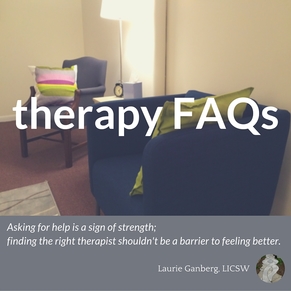
Intrusive thoughts continue to be one of the most challenging symptoms I see people experience in pregnancy, postpartum, and beyond. It's so easy to misunderstand them, few people talk about them, and these sticky thoughts often center on the very things that most upset us.
I'm going to share more information for partners/family members and for therapists in future posts, but to start with, here are five quick facts that might help you understand what's going on if you're experiencing intrusive thoughts.
If you're experiencing significant distress or worry about your intrusive thoughts, you can feel better. And as scary as it seems, talking to someone who understands perinatal intrusive thoughts is a good place to start. If you're not sure who that is in your life, contact the Postpartum Support International HelpLine at 1-800-944-4773.
If you feel like you're in crisis, you can call 988 to be connected to your local crisis team. There's also the 24/7, confidential Maternal Mental Health Hotline: 1-833-943-5746. Book Resources:
I participate in an Affiliate program with Bookshop.org, an online bookstore "with a mission to financially support local, independent bookstores." A purchase from my link will pay me a small commission, and gives a matching percentage to independent bookstores. You can view my Bookshop "shop" here: https://bookshop.org/shop/laurieganberglicsw. These recommendations do not constitute medical advice or a therapeutic relationship.

"Being with" is a concept that shows up a lot when you're a therapist, supervisor, and parent; and it's illustrated beautifully in the children's book The Rabbit Listened by Cori Doerrfeld.
The urge to fix — to provide a solution, to solve a problem, to make your kiddo happy again — is powerful and comes from a place of wanting to help. Yet, this instinct can be the opposite of helpful. You've heard the folks who say, "hey, just relax!" in response to someone's worries, right? It comes across as invalidating, condescending, and definitely unhelpful. When we're able to be with someone in their experience, we can be curious, we can better understand, and ultimately, we can probably be more helpful. In Doerrfeld's book, the rabbit comes along to provide a compassionate presence and and a listening ear; eventually, the child is able to share their story, their emotions, and figure out what to do next. In therapy and supervision, I aim to be a compassionate, nonjudgmental presence and I try to notice those urges to fix when they come up. In doing so, I hope I'm also modeling and supporting my clients in learning how to be with their own experiences and emotions. (The opposite of this is mindless social media scrolling, Netflix binges, etc — a fine distraction some of the time, but not very useful as a long-term strategy.) In the realm of parenting, it can feel even harder. Being with your child in their hurt, sadness, anger, shame, or fear can feel excruciating. When we can do that, we demonstrate that these emotions are tolerable and not something to be feared, avoided, or pushed away. And, when we let go of the responsibility of making our children happy (something we can't really do anyway) there's a sense of relief. All we have to do is be there and listen.
I participate in Bookshop.org's affiliate program. You can see more recommendations at https://bookshop.org/shop/laurieganberglicsw. If you end up buying a book through one of my links, I earn a small commission and they donate the same amount to independent bookstores. Many, if not all, of these books can also be accessed through our amazing public library system, often as physical books, ebooks, or audiobooks!
 I thought I'd take a moment to answer a few common questions I encounter when speaking with prospective clients. Have a question that isn't answered here? Comment below or you can always feel free to contact me. Whether it's due to fear about divulging the thoughts that keep you up at night, hesitation about "starting over" with a new provider, or just the quagmire of finding a therapist who takes your insurance and has openings, reaching out to find a new therapist can be challenging and anxiety-provoking. Wondering about these additional questions is unnecessary. Q: "I see from your website that you specialize in working with pregnant and postpartum women. Can I still see you for therapy if I'm not pregnant/postpartum/a woman?" A: Yes! While I do have a specialty in perinatal mental health and women's reproductive health, I also see adults and adolescents who are neither pregnant nor parenting. And I welcome transgender individuals and men to my practice. I enjoy working with a wide range of people; each brings a multitude of identities and struggles to therapy. The best way to determine if I might be a good fit for you is to schedule a phone consultation. Q: "I have Tufts Health Insurance. Do you accept that?" A: I accept "Tufts Health Plan - Public Plans." These are typically the Tufts Health Plan products that you would have if you have MassHealth or purchased your insurance through the Health Connector. You might have had "Network Health" previously. I do not accept Tufts Health commercial plans at this time. Typically, if you have Tufts insurance through your or your partner's employer, that is a commercial plan. You can always call the Member Services phone number on your health insurance ID card and ask them if I am an in-network provider for outpatient psychotherapy services for your plan. My NPI number is 1639208234. It's always a good idea to confirm that a provider is covered by your individual health insurance. Q: "Can I bring my baby with me to therapy?" A: Probably, yes. I am well aware of how hard it is to find time without the baby to go to appointments. I attempt to make therapy as easy as possible for you to access and if bringing your baby is necessary, they are welcome. I have an activity mat and some toys (though they often also like playing with an empty paper cup!), and the office is big enough for your stroller or carseat. I also have a chair that's comfortable for feeding your baby if necessary. The easiest babies to accommodate in therapy are non-mobile ones. A word of caution that some parents find it challenging to speak openly with their babies in the room - even very young infants. And if it works for you and you'd prefer to leave the baby at home, that's obviously ok, too. Q: Can you help me find a prescriber or complementary practitioner? A: There are many modalities that can alleviate depression, anxiety, and other emotional complications. In my previous clinical work, I helped families create teams of providers all working together to support a child and their family. I've kept that perspective in this work. If medication might be helpful, I can help you talk with your existing medical providers or refer you to a psychopharmacologist. I also regularly refer to acupuncturists, chiropractors, physical therapists, massage therapists, doulas, and lactation professionals.
Asking for help is a sign of strength and finding the right therapist shouldn't be a barrier to feeling better.
 I've been doing some volunteering for Postpartum Support International of MA so I'm especially eager to share that we have been updating the provider and support group listings available on the PSI of MA website or by calling their warmline at 1-866-472-1897. What's a warmline you ask? You call and leave a message and within 24 hours, a volunteer will get back to you to answer questions about postpartum depression, anxiety, and other adjustment challenges, as well as help connect you to providers and support groups in your area. If you're troubled what you or a family/friend is experiencing in the postpartum period and don't know where to start, the PSI of MA warmline is a great place to turn to talk to a knowledgeable, supportive trained volunteer. This post is part of the RESOURCES series where every Thursday I feature websites, organizations, and information about perinatal emotional complications, parenting, therapy, reproductive health, and more. If you have a suggestion for a resource you'd like to see profiled, please let me know in the comments!  For the first time mother, a new moms group can be an anchor during long days of on-demand feedings and unpredictable naps. It's a commitment outside the house. No one cares if there's spit up on the baby's (or your) outfit. And you can find reassurance that others are going through the same challenges, while hearing from the experienced moms of babies a few months older that it does in fact get better - or at least change. Groups combat the stir-crazy. When your mind immediately imagines getting into an accident every time you put your baby in his car seat; when the pure physical ache of grief floods you each time you try to stand up; when you are facing yet another roller coaster month of hope and despair and anger; when you can't stop yourself from yelling at your child you can feel enveloped in a fog of isolation.
For these individuals dealing with postpartum emotional complications, loss, infertility, parenting challenges—and so many more issues—a support group can be a lifeline. The mere act of being in a room with others fights that isolation. In a group, you hear that others have said/thought/felt/done similar things. They nod, they pass the tissues, they laugh with you, and their eyes tear up because they recognize your story. Sometimes you have the perfect resource or a "been there done that" to share that helps someone else. Sometimes you just want to go to report a great success. You can leave a support group more confident, less alone, with a tiny bit less stress, with an idea to implement, simply lighter after a good cry or a vent or a laugh. You can find solace in a group. Resources:
 Last weekend, I was at a workshop with Bo Forbes entitled "Yoga for Emotional Balance: Simple Practices to Help Relieve Anxiety & Depression." To be honest, I'm not entirely sure yet what and how I might incorporate the workshop into my own life and into my clinical practice, but I wanted to share some initial thoughts. There were some ideas which seemed relatively straightforward:
These ideas fit with my frameworks for depression, anxiety, trauma, and the nervous systems. And they seem relatively accessible to share with the women, men, and adolescents with whom I work. Certainly any practice that encourages people to inhabit their body with conscious and compassionate attention is beneficial - especially when I think about women who've experienced birth traumas or losses, clients with chronic pain, or adolescents with body image struggles. Other aspects of the training elicited more bewildering discomfort. But to paraphrase Forbes: awkward is good; awkward is where the learning happens. So, I'm still mulling over interoception (briefly, this means the sense of the physiological condition of the body), the enteric nervous system in the gut, and how shifting visceral (or, body-based) resilience to change through slow, deliberate movement actually affects emotional resilience. I'm excited to integrate some of these concepts in my learning and practice. I think that there are also some valuable connections to make with new research about the role of inflammation, depression, and the consequences for perinatal mental health. And I'm feeling quite grateful for the opportunities that I have to go and take workshops outside my comfort zone and learn from other communities! Here's a quick little video of Bo Forbes talking about the nervous system - not from the training I went to, but it gives a sense of her framework.
I'd love to hear your thoughts in the comments, particularly if you're a clinician incorporating more body-based interventions in your practice.  In 2007, Massachusetts implemented the Children's Behavioral Health Initiative (CBHI) in response to a class action lawsuit on behalf of Medicaid-eligible children with serious emotional disturbances to provide improved screening, evaluation, and access to behavioral health services for youth up to age 21 with MassHealth. One of the services created was Intensive Care Coordination (ICC) to "help get all the adults in your child’s life to work together." In my previous work as an in-home family therapist, mobile crisis intervention supervisor, and point of contact for families entering the CBHI system, I can tell you this is one of the biggest challenges and most important factors in providing effective care that wraps around and buoys a child and the family. While some families I worked with had a dedicated Intensive Care Coordinator, others relied on the family therapist or outpatient therapist to provide the coordination. Too often, it fell on a parent who was already approaching or well past the stage of burnout trying to decipher acronyms and navigate an incredibly complex system all while dealing with anxiety about finding help for their child. Throw in a doctor, a teacher, a special education services coordinator, an occupational therapist, or a mentor and it's not hard to imagine the benefit of making sure everyone's talking to each other. In my private practice, I see children and families, as well as individual adults, and I always consider who else is working with whoever is sitting with me in my office. Together, we review the pros and cons of signing releases allowing me to communicate with those other providers. Here are some common themes that arise:
One of my strengths is looking at the bigger picture and navigating larger systems. When we think together about who is currently involved in your life and how you'd benefit from working with other providers, we have the best chance of efficiently meeting your goals, but it's critical that appropriate communication happens to ensure everyone on your team is working together. Do you have any success stories or cautionary tales of collaboration among providers? Therapists, what makes you hesitant or excited to take on the role of coordinating care? Please feel free to share your thoughts in the comments. |
Therapy, Groups, Supervision, Consultation, Training in Seattle, WA and online in Washington state
Laurie Ganberg, LICSW, PMH-C (#LW60673320) ~ Specializing in Perinatal Mental Health, Trauma, & Fat Liberation
Now practicing through Fiddlehead Therapy, PLLC with online services and in person in Mountlake Terrace, WA
Home | Privacy | Contact | Zoom Link
© 2019-2024 All rights reserved
Laurie Ganberg, LICSW, PMH-C (#LW60673320) ~ Specializing in Perinatal Mental Health, Trauma, & Fat Liberation
Now practicing through Fiddlehead Therapy, PLLC with online services and in person in Mountlake Terrace, WA
Home | Privacy | Contact | Zoom Link
© 2019-2024 All rights reserved

